June 15, 2025 | 08:13 GMT +7
June 15, 2025 | 08:13 GMT +7
Hotline: 0913.378.918
June 15, 2025 | 08:13 GMT +7
Hotline: 0913.378.918
During these days, Tran Duy Thuan, Director of Ben Luc Agricultural Service Cooperative in Luong Hoa Commune, Ben Luc District, Long An Province is busy directing workers to harvest seedless lemons so that the lemon could be processed and packed in time, ready for Tet market.

Seedless lemon grow well in Ben Luc District, Long An Province. Photo: Minh Sang.
The talk with Thuan was sometimes interrupted by phone calls from wholesalers to him to order fresh lemons to serve the Tet market. He said that his cooperative received a few businesses who came to see fresh lemons and buy the fruit to export.
Thuan’s parents have five children. He is their first child. His parents were farmers who relied only on farming to earn their living.
In 1989, Thuan decided to leave his hometown to HCM City, hoping to find a job to help his parents raise his younger brothers and sisters.
As soon as arriving in HCM City, he studied mechanical engineering as he liked it. Then, he applied for a job in a mechanical construction company, specialising in machinery and equipment for road and bridge construction in the city.
In 1996, he was assigned as commander of the construction site of provincial road 830 in Ben Luc district. That was one of the key roads of Long An province.
“Working here, I had an opportunity to meet with many farmers. People here are so friendly, gentle and honest. I met my wife here. We got married and then decided to live here, " Thuan shared.
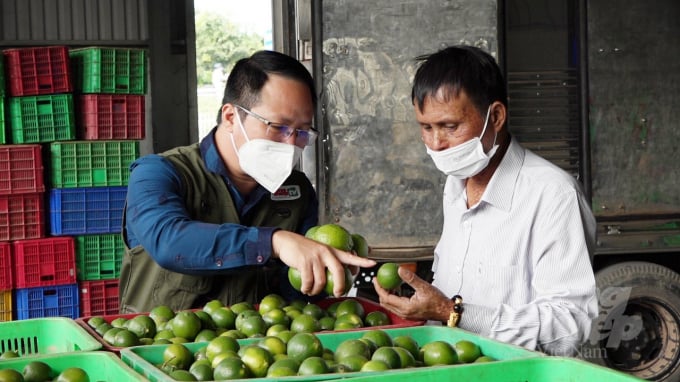
Seedless lemons for export. Photo: MS.
At that time, during flood season, parts of the province were deeply flooded. Thuan said that at the time, he thought it was necessary to build the embankment with a new effective flood prevention work.
So, he resigned from his job as a construction worker with a high salary to return to investing in manufacturing and assembling machines. At the same time, he established a team of mechanics specialising in the construction of dikes to prevent floods.
His team quickly completed the construction of dikes to prevent floods, helping rural traffic to be upgraded and spacious. Thus, residents can travel more conveniently.
At that time, Ben Luc District was still the land of sugarcane but sugarcane failed to prosper local farmers’ lives. Gradually, farmers got bored with sugarcane and started to switch to growing seedless lemon trees. However, seedless lemon farming still faced limitations including ineffective traditional farming methods and high labour cost, which resulted in a high production cost and low profits.
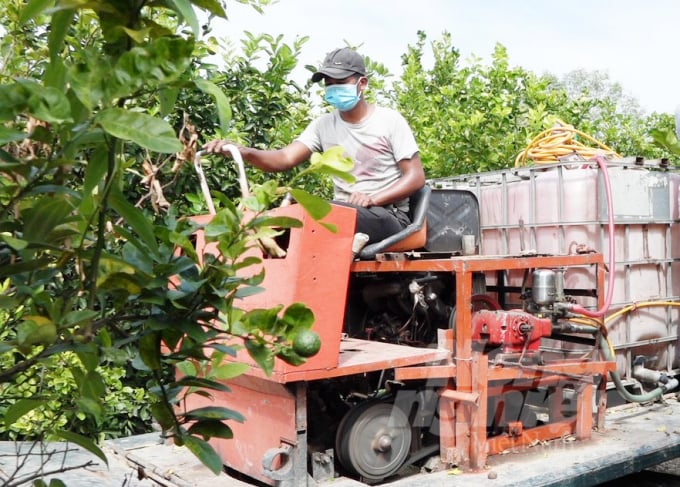
Machines are used in all stage of lemon production. Photo: Minh Sang.
Seeing the limitations, Thuan thought of using machines in production and harvesting lemons to replace human labor and provide high efficiency. Therefore, he invested in opening a facility specialising in manufacturing all kinds of farming machines.
In the past, farmers in the heavily alkaline soil of Ben Luc district had to tie their production to sugarcane, regardless of price fluctuations or threats from pests and diseases. They hardly had any alternative crop.
However, now, a large area has been used to grow seedless lemon.
Thuan said that after days of promoting mechanisation in seedless lemon farming for local farmers, he learned a lot from their experiences in farming, as well as growing seedless lemons.
Since then, he was determined to establish a cooperative and associate with farmers to invest in high-tech lemon cultivation.
“When I started to do farming, many friends and even my family members warned me about risks that I could face. However, I was very confident to invest in farming, especially when mechanisation was applied in production, from tending, harvesting to processing for export,” he said.
“Especially when I met the Chairman of the German Cooperative Union to share about the cooperative development path, the more I believed in the path I chose, the more I believe that I would win, "said Thuan.
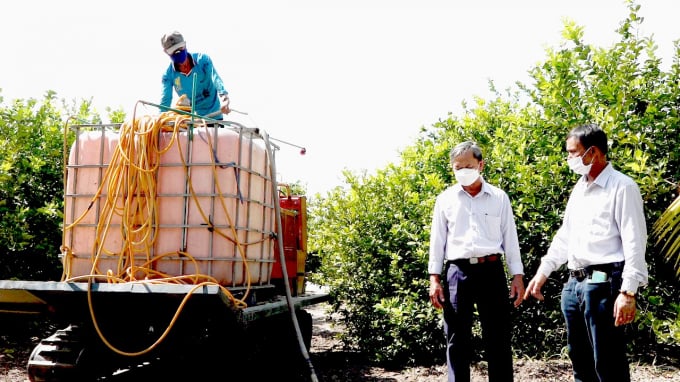
Thuan said that hi-tech agriculture did not mean investment in building large and modern greenhouses and net houses. It was about the process to get high-quality yields and ensure product traceability including where the breed comes from, how to care, what fertilizer to use, what medicine to use.
Thuan’s cooperative applied technological advances in all production stages such as watering, fertilising and making soil so the cooperative needed very few workers.
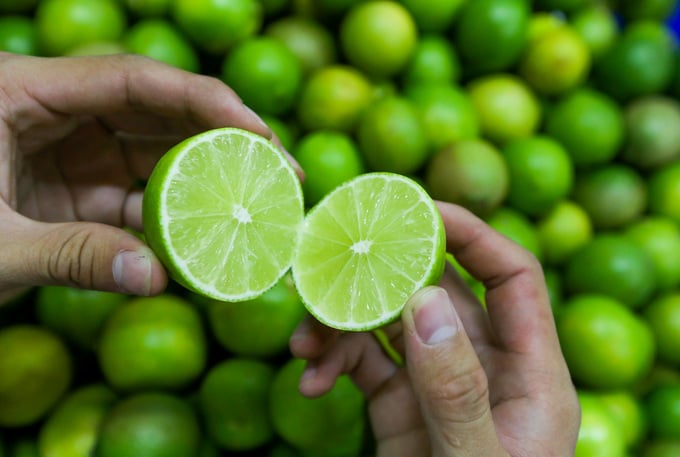
Seedless lemons with high quality are selected for export. Photo: MS.
“To cope with drought and salinity, the cooperative used motorised machines to transport thousands of liters of water to the fields and put a foliar spray fertilizer system at night to help lemons achieve high productivity and efficiency. When harvesting, instead of each farmer having to carry each 50 kg bag of lemons, the cooperative applies mechanisation, bringing the vehicle to the field, just one person can operate and transport dozens of tons of lemons,” he said.
Before applying mechanisation in production, he had to calculate, re-plan the entire field, introduce a closed process from tillage to planting, tending and harvesting conveniently.
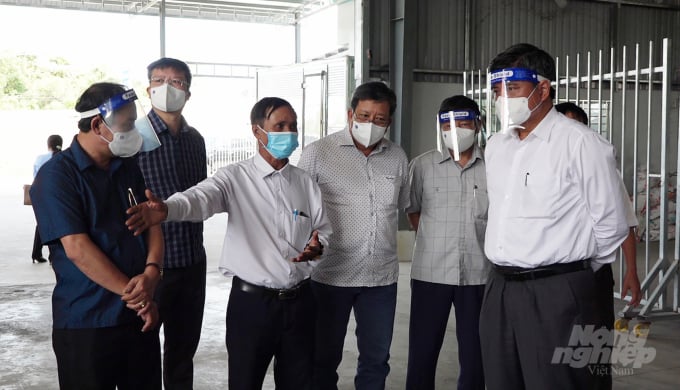
Deputy Minister of Agriculture and Rural Development Tran Thanh Nam (first, right) visits Thuan's co-operative in 2021. Photo: Minh Sang.
Currently, the cooperative has also built a supply-demand connection model to stabilise product consumption, improve preliminary processing and processing technology.
The cooperative has also built a high-quality raw lemon area to meet GlobalGAP standards.
Thuan has recently contacted the Southern Fruit Tree Institute to come up with new ideas on developing high-tech lemon farming. He also invited scientists to further study fruit production and processing, especially for growing lemon on akiline soil.
Translated by Hien Anh
/2025/06/12/3721-2-202745_83.jpg)
(VAN) TH made an impression at Seoul Food 2025 with its line of natural beverages, paving the way for Vietnamese food products to enter the South Korean market.

(VAN) Soc Trang's success in rice exports stems from a strategy of developing fragrant and specialty rice cultivation areas and standardizing production toward low-emission practices.
/2025/06/11/1311-5-120811_839.jpg)
(VAN) The pig farming industry is facing the challenge of comprehensive restructuring to meet requirements for quality, safety, traceability, and market expansion both domestically and for export.

(VAN) Vietnam considers participating in ALGROALBA in order to expand agricultural production, coordinate the assessment and effective exploitation potential land.
/2025/06/05/5314-1-184727_407.jpg)
(VAN) From seemingly worthless fish scales and skin, enzymes and lactic ferments can transform by-products into peptides, opening a sustainable, effective business direction and elevating Vietnamese seafood.

(VAN) TTC AgriS and IFC signed a strategic partnership to develop a sustainable agricultural value chain, aiming to achieve the Net Zero target by 2035.

(VAN) Seafood by-products are opening a new path, combining green growth and technological innovation to enhance the industry's value.